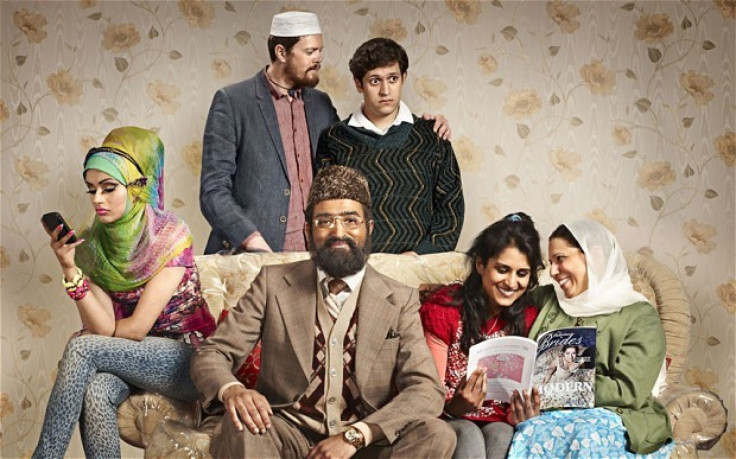Outrage Over Muslim Sitcom Highlights Growing Challenges Of Ethnic Comedy

There is a moment in "Citizen Khan," the new BBC sitcom about a Muslim family living in Britain, when the teenage daughter of the titular patriarch rushes to put on a hijab and pretends to be reading the Koran when her father enters the room.
That scene, along with several others from the Monday premiere, provoked a flood of almost 200 complaints from angry viewers complaining that the show presents an insulting, tasteless and stereotypical view of the Muslim community.
"This is terrible stereotyping, ignorant and just dreadful," one viewer commented.
"We expected a comedy show but now we have witnessed a mocking show," another viewer said.
Some media professionals have been equally unkind. Arifa Akbar, an editor and arts correspondent for the Independent, blasted the show as "not just outdated, but lazy and offensive."
In a statement to the International Business Times, a spokesperson for the BBC network downplayed the criticism, saying the show received largely positive reactions from viewers and also scored big in the ratings. In its late-night timeslot, "Citizen Khan" attracted 3.6 million viewers and a 21.5 percent share, according to the network.
The BBC also said that many members of the Muslim community praised the show and its creator, Adil Ray, a British Muslim of Pakistani descent who also stars as Khan. "Alongside these appreciations, a small percentage of viewers have complained to the BBC regarding the show's portrayal of the Muslim community," the spokesperson admitted. "New comedy always provokes differing reactions from the audience and as with all sitcoms the characters are comic creations and not meant to be representative of the community as a whole."
The BBC said that the official number of complaints it received is fewer than 200, but it also suspects that a lobbying campaign might be partially responsible for the backlash.
The reactions to "Citizen Khan" highlight the tricky balancing act of ethnic and religious humor in an age of increasing diversity. Some in the media have suggested that a present hypersensitivity within the Muslim community all but guarantee that a comedy like "Citizen Khan" will provoke an impassioned response, but the show is not the only sitcom of late to come under fire for poking fun at a particular ethnic group.
Earlier this year, Rob Schneider's short-lived sitcom, "Rob" -- in which the comic actor played a landscape architect who marries into a Mexican-American family -- was called offensive and stereotypical by some critics, forcing Schneider to go on the defensive and publicly defend the program shortly after its premiere. Around that same time, ABC's sitcom "Work It" also provoked complaints from the Latino community after one of the characters, hoping to land a job at a pharmaceutical company, tells his friend, "I am Puerto Rican. I would be good at selling drugs."
Susanne Ramirez de Arellano, a writer for Fox News Latino, likened the joke to Uncle Tom humor, and called on ABC and Amaury Nolasco, the actor who said the line, to apologize. The issue was almost instantly moot, however, as ABC cancelled the series after only two episodes.
On NPR's "Morning Edition" in February, media critic Eric Deggans cited the lack of black actors playing "maids, sassy, streetwise pimps or bug-eyed buffoons" as evidence that TV comedy has made strides in its depictions of certain groups. However, he lamented the persistence of stereotypes for Asians and Latinos, citing both "Rob" and "Work It" as examples. Deggans also criticized the CBS sitcom "2 Broke Girls," which features a socially awkward "mostly asexual" Asian character who speaks broken English.
But some viewers suggest that critics just aren't getting the joke. On YouTube, where the "Work It" scene has attracted more than 73,000 views, many user comments take the stance that comedy works best when it's an equal-opportunity offender. "Whoever gets mad at this video needs a sense of? humor," said commenter Purito84. "All races get made fun of, this was just our turn."
It's also worth pointing out that shows such as "Citizen Khan" are catching heat for the same types of jokes that Seth McFarlane gets away with on a weekly basis on "Family Guy." Moreover, shows from "All in the Family" to "Saturday Night Live" have practiced insult-everybody ethnic humor for decades, not only living to tell about it but also emerging as classics of the form.
On Wednesday, the debate over "Citizen Khan" continued to rage on Twitter, with some tweeters praising the show as "brilliant" and others dismissing it as "unfunny" and "stereotypical."
Perhaps Twitter user DarkenedWealth summed it up best, though. "I didn't see it," she wrote. "But aren't all sitcoms based on stereotypes? Humour is going to end up illegal at this rate."
© Copyright IBTimes 2024. All rights reserved.












